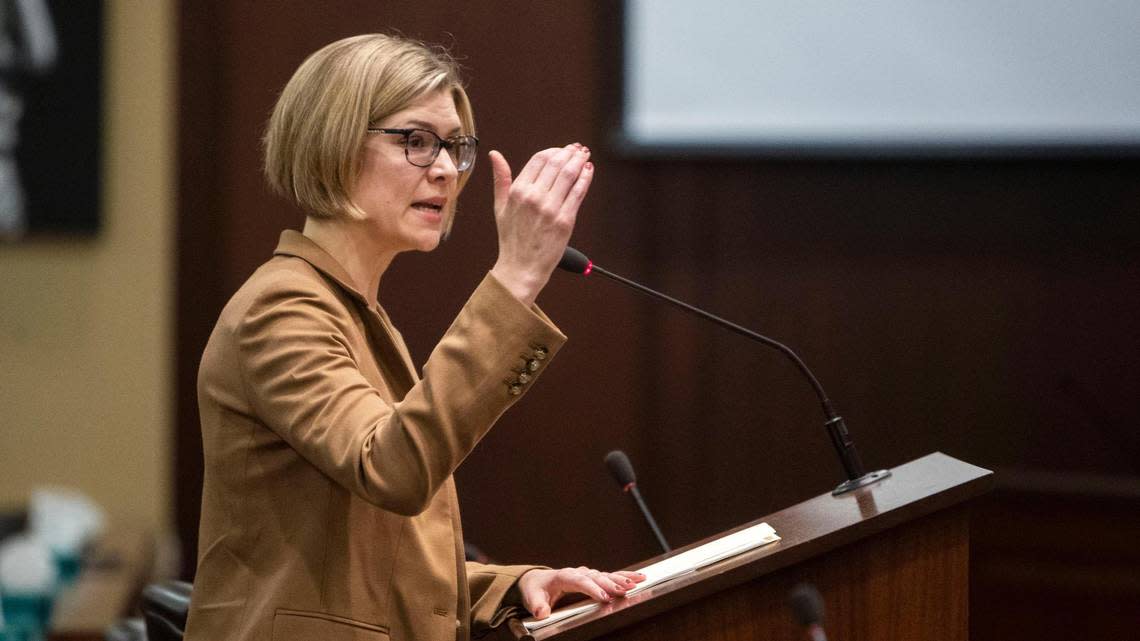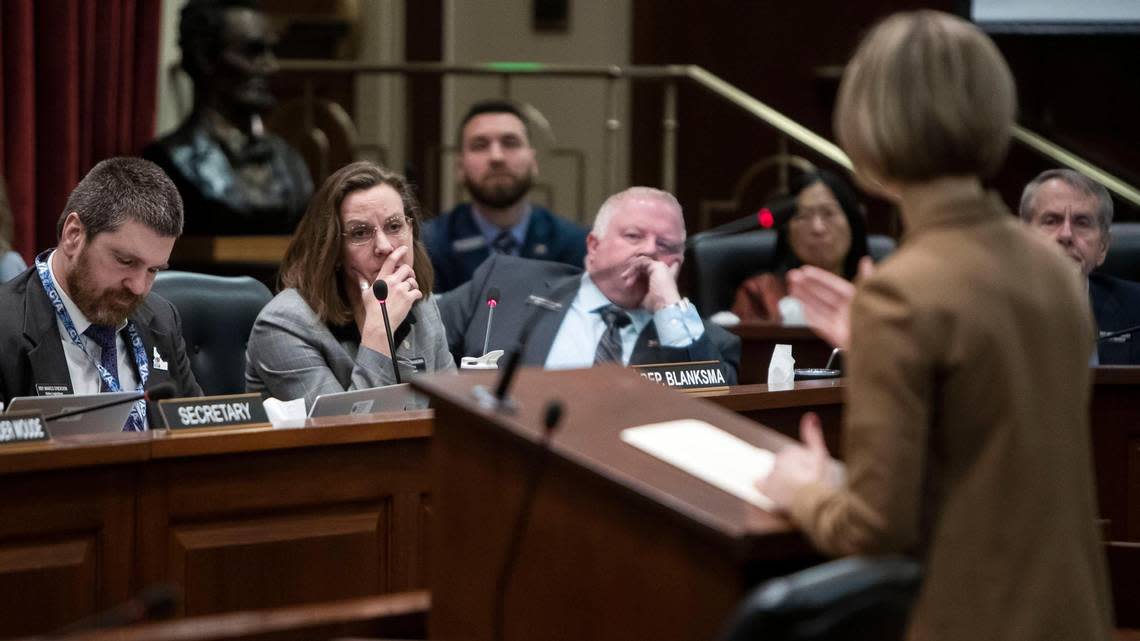What has Medicaid expansion cost? Deadline approaches for Idaho to reconsider program
A new mother with postpartum depression who received medication and counseling. A substitute teacher with terminal cancer whose chemotherapy treatment bought precious time with his family. A food service employee with an opioid dependency who received life-saving treatment.
Those are a few of the thousands of Idahoans benefiting from the state’s expanded Medicaid coverage, Idaho Department of Health and Welfare Medicaid Administrator Juliet Charron told lawmakers Monday, as they consider whether to continue funding expanded eligibility for Medicaid.
“Without Medicaid expansion, participants who lose their coverage may experience gaps in care,” Charron said during a joint meeting of the House and Senate Health and Welfare committees. “And this may be particularly challenging for individuals who are currently receiving care, such as cancer treatment.”
Officials from the Idaho Department of Health and Welfare in recent weeks emphasized to lawmakers the benefits of Medicaid expansion, a state and federal partnership that subsidizes health care costs for low-income Americans who earn up to 138% the federal poverty limit.
Idaho launched Medicaid expansion in 2020 after voters overwhelmingly passed a ballot referendum supporting it. After expanding Medicaid eligibility, Idaho lawmakers set a Jan. 31, 2023, deadline by which they would reconsider that decision.
Cost of cutting Medicaid expansion
About 140,000 Idahoans are enrolled in Medicaid under expanded eligibility.
Most of the roughly $1 billion Medicaid expansion budget covers pharmacy expenses, such as drug costs, followed by hospital services that include preventative screenings, surgeries, COVID-19 hospital stays and emergency room visits.
The Idaho Legislature appropriated more than $1 billion for Medicaid expansion for the first time this fiscal year, which started July 1. The Department of Health and Welfare is requesting a 3% increase next fiscal year.
In next fiscal year’s Medicaid expansion budget request, federal expenses are up about $25 million, to $803 million, compared to this year. The federal government covers 90% of Idaho’s Medicaid expansion costs.
Expenses from dedicated funds — money controlled by the state and set aside for a specific purpose — are up nearly $3.5 million, to $20.9 million. Dedicated funds for Medicaid expansion are paid using settlement money from tobacco companies.
Meanwhile, general fund Medicaid expansion costs — composed mostly of income and sales tax revenue — are expected to decrease next year, from $68 million to $67.4 million.
The added costs of the Medicaid expansion would be covered by the increase in federal funding and state dedicated funds, Charron said.
The major factor driving those costs is an increase in supplemental payments to hospitals that participate in Medicaid, Charron said. That’s the result of a 2022 Idaho law directing more money to hospitals to cover the difference between Medicaid patients and patients covered by Medicare, the federal health insurance program.
Abandoning Medicaid expansion, and therefore, rejecting the $803 million in federal funds, would cost the state more than keeping the program intact, Charron noted. The 90% federal match helps fund indigent health care assistance, behavioral health services and other programs, she said.

Absent Medicaid expansion, the state likely would spend $78 million taking over those costs, $10 million more than the general fund cost of continuing the expanded Medicaid eligibility.
Rep. John Vander Woude, R-Nampa, expressed skepticism that accepting the federal money is worth the savings to the state.
“We have to take in $800 million in order to save $10 (million),” he said during Monday’s meeting.
Lawmakers will decide in the coming weeks whether to continue offering Medicaid to the expanded group. GOP House leadership this month signaled they aren’t keen on it.
House Speaker Mike Moyle, R-Star, said Medicaid spending is “out of control.” Medicaid expansion represents 23% of the state’s roughly $4 billion Medicaid budget, which recently surpassed public education as the state’s largest expense.
“If we do not get this Medicaid animal under control, it’s going to have an impact on education and other places,” Moyle recently told reporters.
The House and Senate Health and Welfare committees are preparing letters for the Legislature, with recommendations on how to move forward on Medicaid expansion, said Vander Woude, who chairs the House committee.

Idaho officials search for cost savings
Idaho Gov. Brad Little included Medicaid expansion in his 2024 budget recommendations to the Legislature. But the Republican didn’t mention Medicaid in his recent State of the State, his annual address on spending priorities.
Little’s administration in the meantime is searching for ways to cut Medicaid costs. Last month, Little joined dozens of other governors calling on President Joe Biden to end a federal public health emergency that bars states from removing Medicaid enrollees amid the COVID-19 pandemic. The emergency is scheduled to end April 1.
About 67,000 Medicaid expansion enrollees likely are ineligible for Medicaid but fall under a group that’s “protected” by continuous enrollment requirements under the emergency, Charron said Monday.
Next month the Idaho Department of Health and Welfare will launch a federally mandated “redetermination” process to purge ineligible enrollees from Medicaid. The process is expected to take six months.
House Majority Leader Megan Blanksma, R-Hammett, on Monday asked whether Health and Welfare will try to recuperate the costs of keeping ineligible enrollees in the program under the federal emergency rules.
“Is there going to be any effort made to recover any of those costs, or are we just going to look at it as funds lost for the six months that that review should be taking place?” she asked.
Federal rules prohibit clawing back those funds or terminating an enrollee’s eligibility before the redetermination process is complete, Charron said. Shirking the rules would result in penalties, she added.
During a House Health and Welfare Committee discussion Tuesday, Rep. Marco Erickson, R-Idaho Falls, recommended waiting two or three years before making changes to Medicaid expansion. Lawmakers would benefit from a clearer picture of the costs, without the effects of COVID-19, he said.
“We had a really strange couple of years,” Erickson said. “We see some skewed numbers, and we didn’t get a true understanding of what’s really going to happen with this expansion.”
House Minority Leader Ilana Rubel, D-Boise, said she’s concerned defunding Medicaid expansion would remove access to cancer treatment drugs and antipsychotic medication.
“I think we could see ... fallout in society that transcends something that might appear on a fiscal spreadsheet,” Rubel said.
Meanwhile, state officials are probing ways to cut Medicaid costs, officials told lawmakers in recent weeks. The Idaho Division of Financial Management last year solicited an independent “cost containment” report from Medicaid consultant Sellers Dorsey.
The Department of Health and Welfare is considering a few ideas from the interim report, Charron said. The interim report was completed last month and included more than a dozen short-term cost-saving measures, such as terminating dental benefits for adults and eliminating the state’s primary care case management system, which allows primary health care providers to monitor Medicaid enrollees while receiving a stipend from the state. A full report that includes long-term cuts will be completed in April.
“We know Medicaid cost containment is important to you and it’s really important to us, too,” Health and Welfare Director Dave Jeppesen told the Legislature’s budget-setting committee last week.
The department last year implemented “value-based payment agreements,” a system in which health care providers cover the cost of Medicaid patient care if it exceeds an annual target and share savings with the state if the cost is less.
Jeppesen said the department’s goal with such programs is for the general fund cost for Medicaid to increase at the same or a slower pace than tax revenue growth.
“We need to do that while preserving access to services for Idahoans, which is going to require ongoing system transformation,” he said.
